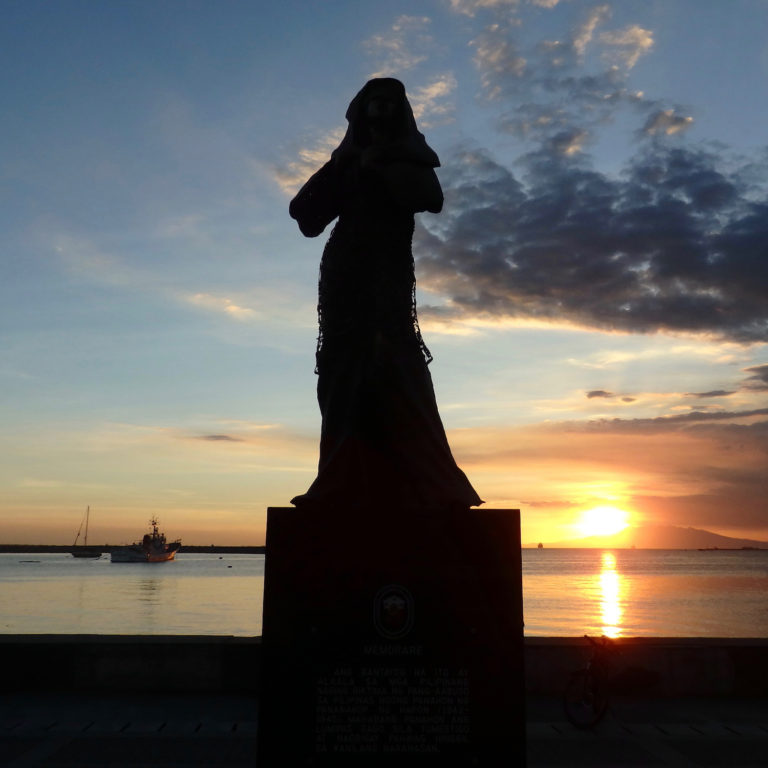Beyond Indelible Pain: History, Memory, and the Actuality of Wartime Violence
抹消不能な痛苦を超えて:歴史、記憶、そして戦時暴力のアクチュアリティ


Date: 27 November 2019, 9:00-14:30
Venue: Creative Collaborative Room, the Arete, Ateneo De Manila University (Katipunan Avenue, Loyola Heights, Quezon City, Philippines 1108)
Speakers / Performers:
Sharon Cabusao-Silva (Gabriela / Lila Pilipina, the Philippines)
Karl Ian Cheng Chua (Director, Japanese Studies Program, Ateneo de Manila University, the Philippines)
Racquel De Loyola (Artist, the Philippines)
Yoshiya Makita (Assistant Professor, College of Policy Science, Ritsumeikan University, Japan)
Celline Marge Mercado (Curator, “In the Spaces We Mend,” the Philippines)
Isabel Consuelo A. Nazareno (Executive Director, Ateneo Library of Women’s Writings, Ateneo de Manila University, the Philippines)
Daisuke Takeya (Artist, Director of Responding, Japan/Canada)
Overview: Over the last few decades, scholars in Asian history and other related fields have uncovered the hidden histories of wartime violence the Japanese military did in the Asia Pacific during World War II. In tandem with the progress of historical inquiries into the Japanese war crimes, activists and supporters for war victims raised their voices to press charges of war responsibilities against the Japanese government. In the Philippines, with brave testimonies of “comfort women” since the 1990s, wartime sexual violence the Japanese military committed in the archipelago has been “re-discovered” and fiercely disputed by many parties. In the last few years, so-called “statues of comfort women” have been erected and removed again and again at various places in the archipelago, highlighting harsh political confrontations the past war has still caused among different groups. Driven by academic research and activist outcry, concerned artists are now attempting to respond to the faint voices of war victims by creating artworks on these and other related issues.
Through ardent efforts of these committed advocates, the questions of wartime violence have slowly but steadily come to be recognized in the Philippines and the world. Yet, the current political disputes have been often waged without a common arena for these diverse parties and groups to share their ideas, goals, and strategies. With scholars, activists, and artists who have unique career and educational backgrounds in and out of the Philippines, this symposium contributes to facilitating critical dialogue between different groups of people who are engaged in the same issues of wartime violence but often with different goals and different approaches. By promoting intellectual exchanges beyond professional sectors and national borders, the symposium would pave a new path to bridge the past experience, present debates, and future visions on war-related violence.
At stake in this symposium is whether we can create critical dialogue with people with different goals and different backgrounds. In close entanglement with current political interests, economic desire, and nationalistic fervor in each country, the present debates on Japan’s war responsibilities have often lacked proper historical grounds. Activist claims for Japan’s apology and compensation have been in some cases divorced from the past reality by ignoring historical evidences. On the other hand, some groups of scholars invest all their energy into the fact-findings of the historical past, while paying little attention to their positionalities in the present political constellation. Artists’ attempts to tackle with these historical issues in their artworks have often ended up in just tracing the secondhand information provided by scholars and activists. With awareness of these current limitations of the three different groups as the starting point, this symposium inquires the ways to better tackle with the issues through mutual criticism beyond professional boundaries. Bridging the professional cleavage by creating a common arena for critical and in-depth dialogue, this symposium facilitates mutual understanding between scholars, activists, and concerned artists and thus opens up new perspectives on the questions of wartime violence.
日時:日時:2019年11月27日 9:00-14:30
会場:アテネオ・アート・ギャラリー、アテネオ・デ・マニラ大学(Katipunan Avenue, Loyola Heights, Quezon City, Philippines 1108)
登壇者/出演者:
シャロン・キャブサオ–シルヴァ(ガブリエラ/リラ・ピリピナ、フィリピン)
カール・イアン・チェン・チュア (アテネオ・デ・マニラ大学日本研究プログラム・ディレクター、フィリピン)
ラケル・デ・ロヨラ(アーティスト、フィリピン)
牧田義也 (立命館大学政策科学部助教、日本)
セリーヌ・マージ・メルカド(キュレーター、“In the Spaces We Mend”、フィリピン)
イサベル・コンスエロ・A・ナザレノ(アテネオ・デ・マニラ大学アテネオ女性文書図書館エグゼクティブ・ディレクター、フィリピン)
武谷大介 (アーティスト、レスポンディング・ディレクター、日本/カナダ)
概要:第二次世界大戦中にアジア太平洋地域において日本軍が加担した戦時暴力の歴史について、アジア史および隣接領域の研究者は20世紀末以降、従来秘匿されていた多くの事象を明らかにしてきました。日本人の戦争犯罪に関する歴史学的調査の進捗と共に、こうした戦時暴力の被害者を擁護する活動家・支援者も、日本政府に対して戦争責任を認めるよう要求を強めていきました。フィリピンでは1990年代以降、元従軍慰安婦女性の証言を契機として、同地域において日本軍が関与した戦時性暴力の諸相が「再発見」され、多くの人々を巻き込んで激しい論争が行われてきました。過去数年は、所謂「慰安婦像」の設置と撤去がさまざまな場所で繰り返され、過去の戦争がいまだ厳しい政治的対立を引き起こしていることが浮き彫りになっています。そして、学術的研究と社会運動の高まりを背景として、この歴史問題に関心をもつアーティストはいま、関連する諸問題を主題とした作品制作を通じて、戦時暴力犠牲者の微かな声に対して応答を試みています。
第二次世界大戦期の戦時暴力をめぐる諸問題は、歴史家・活動家・アーティスト等、多くの人々のこうした献身的な努力を通じて、着実にフィリピン、そして世界で認知されつつあります。しかし一方で、この歴史問題に関する現在の政治的論争は、しばしば論点が食い違ったまま不毛な議論に終わることも多く見受けられます。こうしたすれ違いは、歴史修正・否定論者と対峙する場面だけでなく、戦時暴力被害に対する正義と公正という大局的な目標と意義を共有する個人・集団間でも発生し、各々の思想・目的・戦略について相互理解が欠落したまま、非難の応酬に終始することもあります。本シンポジウムは、多様な経歴・背景をもつ研究者・活動家・アーティストと共に、戦時暴力という歴史的問題に取り組むさまざまな人々が、それぞれの視点・信条・立場を超えて、批判的な対話を行う条件を探究します。そして、専門分化された職業的境界や民族・国籍の差異を越えた知的交流を促進することで、本シンポジウムは戦時暴力をめぐる過去の経験、現在の論争、そして未来の理想を架橋する新たな方途を模索します。
本シンポジウムの要は、異なる目的・背景をもった個人・集団間で、批判的な対話を創出することにあります。政治的利害、経済的欲望、そして各国の愛国主義的熱狂と密接に絡まり合いながら、日本の戦争責任をめぐる現在の論争は、しばしば歴史学的基盤が欠落した状態で展開されています。日本政府の謝罪と補償を求める活動家の主張は、ときとして歴史学が提示する証拠を黙殺し、過去の現実から乖離するかたちで訴えられることもあります。他方で、研究者のなかには、学術的な観点から過去の事実関係を洗い出すことに注力する反面、現在の政治的布置における自身の立場性については考慮しない者も多くいます。そして、こうした歴史問題に作品制作を通じて取り組もうとするアーティストは、往々にして研究者・活動家が提供する二次情報をなぞるだけで終わってしまいます。本シンポジウムはこうした問題意識を出発点として、戦時暴力に関する諸問題に対する取り組みを、専門領域の境界を越えた相互批判を通じて再考します。こうして批判的かつ徹底的な議論のための共有地を創出することで、本シンポジウムは研究者・活動家・アーティストという異なる集団間の相互理解を深め、戦時暴力をめぐる諸問題に対する新たな視座を切り拓きます。
Biographies of the Presenters
Archivist:
Isabel Consuelo A. Nazareno (Philippines)
Activist:
Sharon Cabusao-Silva (Philippines)
Artists:
Racquel De Loyola (Philippines)
Daisuke Takeya (Japan)
Celline Marge Mercado (Philippines)